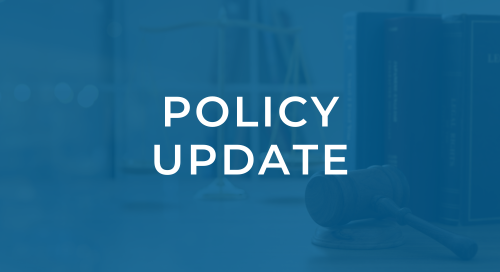
We are kicking off the start of summer light on policy news, in anticipation of next month’s Proposed 2024 Physician Fee Schedule. Stay tuned for our full summary and analysis in early July. In the meantime, we link to some webinar and podcast recordings on some top-of-mind issues and share some state policy highlights.
ICYMI: Webinars on reducing prior authorization, addressing social drivers of health
Multi-State Policy Collaborative on Reducing Prior Authorization Burden
On May 24, the Policy Team hosted a successful Multi-state Collaborative webinar focused on prior authorization. Dr. Becky Jaffe facilitated a lively and informative discussion with Senator Missy Irvin (R-AR) who helped pass legislation to reduce prior authorization in Arkansas, while Dr. James Zini and Dr. John Cawley provided the physician perspective from Arkansas and Colorado, respectively. Ryan Biehle, CEO and EVP of the Colorado Academy of Family Physicians, spoke about legislative advocacy efforts in Colorado. You can watch the full webinar here.
Addressing Social Drivers of Health through Accountable Care
On June 1, the Policy Team hosted a webinar focused on accountable care organizations (ACOs) taking on the challenge of addressing food insecurity, transportation barriers, and helping their patients and communities connect to social services and community resources. The webinar features Angie Walker, manager of the Randy Walker Family Practice and Allergy Clinic in Arkansas, and Dr. Sanjay Batish, owner of Batish Family Medicine in North Carolina, sharing success stories, best practices and actionable strategies to address social drivers of health in your everyday operations. You can watch the full webinar here.
Aledade talks to CMS leadership about what’s next for accountable care
In this episode of Aledade’s ACO Show podcast, Aledade’s Chief Policy Officer, Sean Cavanaugh, a former Director of Medicare and senior leader at the Center for Medicare and Medicaid Innovation (CMMI) hosts a conversation with Meena Seshamani, M.D., Ph.D., Deputy Administrator and Director for the Center for Medicare, and Elizabeth Fowler, Ph.D., J.D., Deputy Administrator and Director of the CMMI.
Highlights included how after a decade of learnings from testing different payment and delivery models, CMMI is using MSSP as the chassis for innovation in future models, a concept that Aledade has long championed. When the conversation turned to the future of quality, it was clear that while CMS’s goal is to align a core set of quality measures across all programs, Aledade’s goal is to align but also reduce quality measures to focus on the ones that matter most for patient outcomes.
Seshamani also spoke about how CMS is implementing the Inflation Reduction Act, a historic law that gives CMS the authority for the first time to negotiate the price of some drugs in Medicare. The law’s aggressive timelines mean the agency is hitting the ground running to implement provisions such as zero dollars out of pocket for recommended vaccines, and $35 copay caps for a month of insulin in Part D.
Aledade State Policy Committee leader selected to serve on California Advisory Committee
We are excited to report that our California Policy Committee champion, Dr. Sumana Reddy, MD, FAAFP, was recently selected to serve on California’s Health Care Affordability Board Advisory Committee. The Advisory Committee will have an important role advising on critical state actions, such as establishing benchmarks for primary care spending and statewide goals for alternative payment model adoption. We are thrilled to see Dr. Reddy’s skill and experience was recognized in her selection to participate in this work. Dr. Reddy’s practice is a top performer in access and prevention, quality of care, post hospital care, and emergency room follow-up.
Through Aledade’s policy committee, she has been a thought leader and skillful advocate for evidence-based solutions to strengthen primary care and improve patient outcomes. She led our committee as a champion on issues of primary care spending, and improving the health of communities while also ensuring accountable and efficient systems that are built around the principle of providing quality care to patients. Her work in particular demonstrates the value and high level of community engagement of independent primary care.




